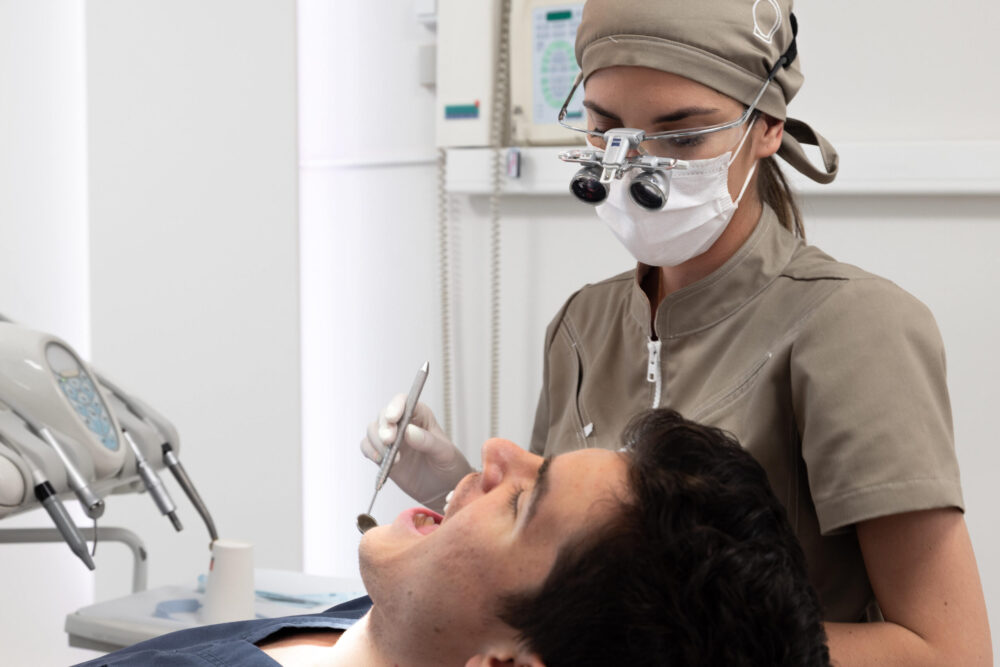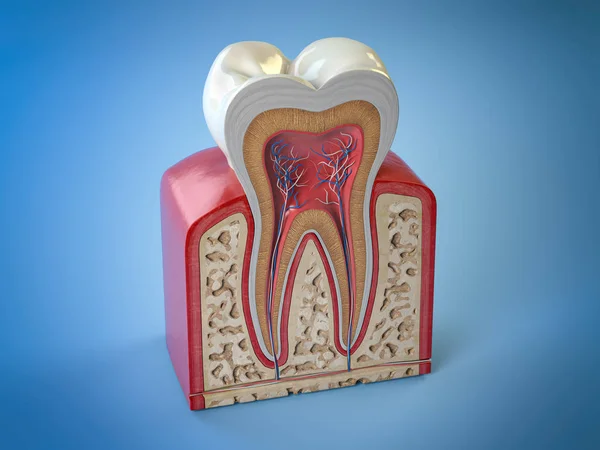Wisdom teeth removal is a common dental procedure, often necessary to address overcrowding, pain, or infection. However, like any surgical operation, it carries risks—one of the most concerning being nerve damage. While rare, nerve injuries can lead to symptoms like numbness, tingling, or pain in the mouth, lips, or tongue.
Table of Contents
ToggleIn this article, we’ll explore everything about nerve damage caused by wisdom teeth removal—its causes, symptoms, treatments, and prevention tips.
What Are Wisdom Teeth?
Wisdom teeth, also known as third molars, are the last set of molars that typically emerge between the ages of 17 and 25. These teeth were once essential for chewing coarse food, but with modern diets and smaller jaws, they are often unnecessary.
Because of limited space in the mouth, wisdom teeth may grow at odd angles or become impacted, leading to swelling, infection, and discomfort. This is why removal is sometimes required.
Why Are Wisdom Teeth Removed?
Dentists recommend wisdom teeth removal in the following cases:
- Impacted Teeth: Teeth trapped in the gums or jawbone.
- Crowding Issues: Limited space in the jaw may lead to misalignment.
- Infection or Cysts: Impacted teeth can form cysts or lead to gum infections.
- Pain and Swelling: Persistent discomfort often warrants extraction.
Although the procedure is routine, complications such as nerve damage may arise, especially if the teeth are deeply embedded near vital nerves.
Understanding Nerve Damage After Wisdom Teeth Removal
Nerve damage occurs when oral nerves are bruised, stretched, or severed during surgery. The two most affected nerves are:
- Inferior Alveolar Nerve (IAN): Controls sensation in the lower lip, chin, and teeth.
- Lingual Nerve: Provides sensation to the tongue and the inner part of the lower gums.
Damage to these nerves can result in temporary or permanent issues, such as numbness, tingling, or altered taste. Understanding the risks involved can help patients make informed decisions before surgery.
Causes and Risks of Nerve Damage
Anatomy of the Oral Nerves
To better understand the risks, let’s dive into the anatomy of the nerves involved:
- Inferior Alveolar Nerve (IAN):
- Runs along the lower jawbone.
- Close proximity to lower wisdom teeth makes it vulnerable during extractions.
- Lingual Nerve:
- Located near the tongue, just below the gums.
- Injury often occurs during lower wisdom teeth surgery.
How Does Nerve Damage Occur During Surgery?
Nerve damage typically happens when:
- Drilling or Cutting: Surgical tools may graze or compress nearby nerves.
- Bone Removal: Deeply impacted teeth require cutting through the jawbone, increasing the chance of nerve exposure.
- Excessive Force: Improper handling of instruments can stretch or bruise the nerves.
- Anesthetic Injection: Rarely, anesthetic injections can irritate or injure nerves.
Symptoms of Nerve Damage
Early Signs to Watch For
Immediately after surgery, patients might experience:
- Numbness in the lips, chin, or tongue.
- Tingling sensations (similar to “pins and needles”).
- Loss of taste or altered taste sensations.
- Difficulty speaking or chewing due to loss of feeling.
Long-Term Symptoms of Nerve Injury
If symptoms persist for weeks, it may indicate more serious damage. Long-term effects include:
- Chronic pain or burning sensations.
- Permanent loss of sensation in affected areas.
- Psychological distress due to persistent discomfort.
Types of Nerve Damage After Wisdom Teeth Removal
Temporary Nerve Damage
- Most cases resolve within a few weeks to months as nerves heal naturally.
- Symptoms include mild tingling and occasional numbness.
- Recovery can be supported with medication and physical therapy.
Permanent Nerve Damage
- Occurs if nerves are severely cut or crushed.
- May require surgical interventions like nerve grafting.
- Symptoms persist indefinitely and may require ongoing pain management strategies.
Diagnosis and Treatment Options
Medical Evaluation and Tests
Doctors often use:
- Clinical Tests: Assessing sensation in affected areas.
- Imaging Scans: CT scans to check nerve positioning.
- Electromyography (EMG): Evaluates nerve function and extent of injury.
Treatment for Mild Nerve Damage
- Anti-inflammatory Medications: Reduce swelling around nerves.
- Steroid Injections: Accelerate healing by reducing inflammation.
- Physical Therapy: Helps retrain nerves and improve sensation.
Advanced Treatments for Severe Cases
- Nerve Grafting Surgery: Repairs damaged nerves with tissue grafts.
- Microsurgery: Restores nerve connections.
- Neuromodulation Therapy: Uses electrical signals to reduce pain.
Prevention of Nerve Damage
Pre-Surgical Evaluations
Proper preparation before wisdom teeth removal can significantly reduce the risk of nerve damage. Key steps include:
- X-rays and 3D Imaging: Advanced imaging techniques help pinpoint the exact location of nerves relative to the wisdom teeth.
- Comprehensive Oral Examination: Dentists assess the complexity of the extraction and evaluate risk factors like impacted teeth or jawbone density.
- Patient Medical History: Conditions such as nerve sensitivity or prior dental surgeries are considered to tailor the procedure safely.
- Informed Consent: Dentists explain potential risks, including nerve damage, ensuring patients are fully aware before surgery.
Choosing a Skilled Oral Surgeon
Selecting a highly qualified and experienced oral surgeon is crucial to minimize complications.
- Experience with Complex Cases: Look for surgeons who specialize in impacted or high-risk extractions.
- Technology and Equipment: Clinics with modern technology, such as 3D imaging and guided surgery tools, can perform precise and safer procedures.
- Reviews and Recommendations: Check online reviews or ask for referrals to find a trusted professional.
Recovery Process and Healing Tips
Healing Timeline for Nerve Recovery
The recovery process for nerve damage varies based on severity:
- Mild Damage: Healing often takes 4–8 weeks with gradual improvement in sensations.
- Moderate Damage: Recovery may take 3–6 months, requiring medication or therapy for support.
- Severe Damage: Permanent nerve injury may not heal completely and might necessitate ongoing treatments or surgical intervention.
Home Remedies and Care Tips for Faster Recovery
- Follow Post-Op Instructions: Avoid physical activity and stick to the prescribed medication schedule.
- Cold Compress: Apply ice packs to reduce swelling and inflammation within the first 24–48 hours.
- Soft Diet: Stick to soft foods like yogurt, smoothies, and soups to avoid stressing the surgical area.
- Avoid Smoking and Alcohol: These can delay healing and increase infection risks.
- Oral Hygiene: Use salt water rinses and gentle brushing to keep the mouth clean without disturbing the surgical site.
- Massage and Exercises: Facial massage or light exercises can stimulate blood flow and support nerve regeneration.
Living with Nerve Damage
Coping Mechanisms for Long-Term Nerve Issues
When nerve damage becomes a long-term issue, coping strategies are essential for improving quality of life:
- Pain Management Techniques: Over-the-counter medications or prescription drugs like gabapentin can help manage chronic pain.
- Physical Therapy: Exercises designed to stimulate nerve function and muscle movement may help restore some sensations.
- Counseling and Support Groups: Psychological support can help patients cope with the emotional challenges associated with nerve damage.
- Alternative Therapies: Acupuncture, chiropractic care, and massage therapy may provide relief from symptoms.
Lifestyle Adjustments and Therapies
Patients with permanent nerve damage may benefit from:
- Speech Therapy: If nerve damage affects tongue movement, therapy can improve speaking and eating abilities.
- Adaptive Devices: Tools like bite splints or oral guards can protect affected areas and reduce discomfort.
- Mindfulness and Relaxation Techniques: Practices like yoga and meditation can help manage stress and pain perception.
Conclusion
Nerve damage after wisdom teeth removal, while uncommon, is a potential risk that should not be overlooked. Understanding the causes, symptoms, and treatment options empowers patients to make informed decisions before undergoing surgery.
Choosing an experienced surgeon, undergoing thorough pre-surgical evaluations, and following proper post-operative care can significantly reduce the chances of nerve injuries. For those affected, early diagnosis and treatment can improve recovery outcomes.
If you suspect nerve damage after wisdom tooth extraction, don’t hesitate to consult your dentist or oral surgeon immediately. Timely intervention often makes all the difference in restoring nerve function and preventing long-term complications.












